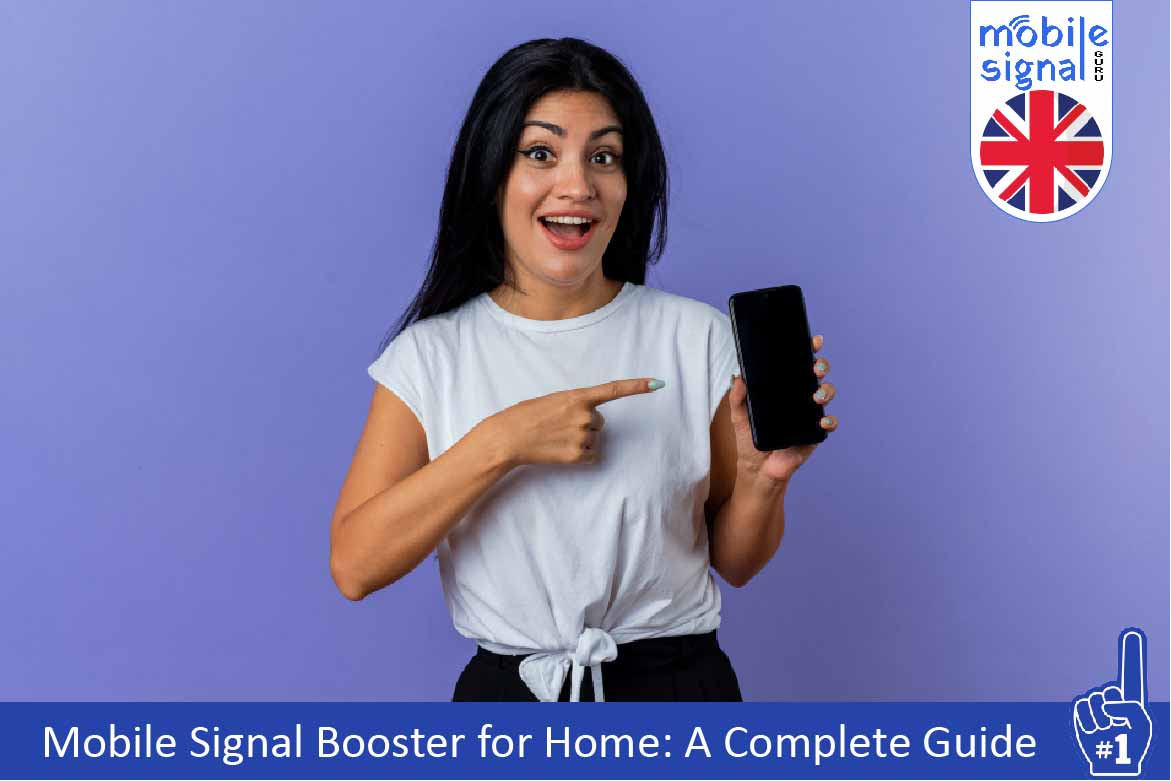Do you experience weak mobile signal at home? A mobile signal booster can be the perfect solution. In the United Kingdom, signal problems can occur due to various reasons, such as living far from a cell tower or in a building with thick walls. This guide will help you understand what a mobile signal booster is, how it works, and how to choose the best one for your home.
What is a Mobile Signal Booster?
A mobile signal booster is a device that improves weak mobile signals. It captures a weak signal from a nearby cell tower, amplifies it, and rebroadcasts it inside your home. This can lead to clearer calls, faster data speeds, and fewer dropped connections.
Why You Need a Mobile Signal Booster for Your Home
In many parts of the UK, weak mobile signals are a common issue. There are several reasons why you might need a signal booster:
- Distance from Cell Towers: If you live in a rural area or on the outskirts of a city, you may be far from the nearest cell tower.
- Building Materials: Thick walls, metal roofs, or concrete structures can block mobile signals.
- Indoor Coverage: Even in areas with good outdoor signal, homes can still have poor indoor coverage.
A mobile signal booster solves these problems by boosting the signal where you need it most—inside your home.
How Does a Mobile Signal Booster Work?
A mobile signal booster has three main components:
- External Antenna: This is placed outside your home to capture the weak signal.
- Amplifier: This device boosts the strength of the captured signal.
- Internal Antenna: This rebroadcasts the amplified signal throughout your home.
The external antenna captures the signal from the nearest cell tower, the amplifier increases its strength, and the internal antenna broadcasts it inside. This ensures better signal coverage in areas where reception was previously weak or unreliable.
Types of Mobile Signal Boosters
There are different types of mobile signal boosters based on your needs and the type of signal you want to improve. Here are the common types:
- Single-Band Boosters: These boost one type of signal, such as 4G or 3G. They’re ideal if you only need to improve one network frequency.
- Multi-Band Boosters: These can amplify multiple types of signals (e.g., 2G, 3G, 4G, or even 5G). They’re ideal for homes with multiple devices on different networks.
Choosing between a single-band or multi-band booster depends on your specific needs, such as whether your home has devices from multiple carriers.
How to Choose the Right Mobile Signal Booster for Your Home
Selecting the right booster depends on several factors. Here’s what you should consider:
Coverage Area
Different boosters cover different areas. For example:
- Small Homes or Apartments: Boosters that cover up to 150 square meters are ideal.
- Medium-Sized Homes: Boosters covering 300–500 square meters will provide adequate signal.
- Large Homes: For homes over 500 square meters, you’ll need a more powerful booster.
Choose a signal booster based on the size of your home to ensure proper signal coverage.
Network Compatibility
Ensure the booster you choose is compatible with your mobile provider. In the UK, networks like Vodafone, EE, O2, and Three use different frequencies. Check the booster’s specifications to make sure it supports your network’s frequency.
Signal Strength Outside Your Home
Before buying a booster, test the signal strength outside your home. This can be done by checking the signal bars on your phone or using a mobile app. If the signal outside is weak (less than two bars), you may need a more powerful booster. If it’s moderate, a mid-range booster will suffice.
Ease of Installation
Most mobile signal boosters are easy to install and come with user-friendly instructions. However, some models may require professional installation, especially if the external antenna needs to be mounted high up or in a complex location. Choose a model that suits your DIY skills, or consider hiring a professional installer.
Legal Considerations in the UK
In the United Kingdom, it’s important to use a mobile signal booster that meets regulatory standards. Ofcom, the UK’s communications regulator, requires that all boosters sold and used must be Ofcom-approved. This ensures that the booster won’t interfere with mobile networks or cause signal problems for other users.
When purchasing a booster, check for CE certification to ensure it’s legal for use in the UK. Using non-CE certified devices can lead to fines or disruptions in service.
Benefits of Using a Mobile Signal Booster
Here are some of the main benefits of using a signal booster in your home:
- Improved Call Quality: Clearer calls with fewer interruptions and dropped connections.
- Faster Data Speeds: Boosted signal leads to faster internet browsing, smoother video streaming, and quicker downloads.
- Extended Battery Life: When your phone has a strong signal, it doesn’t need to work as hard, which can help extend its battery life.
- Support for Multiple Devices: Most boosters can improve the signal for multiple devices at once, so everyone in your home can benefit from stronger coverage.
Common Myths About Mobile Signal Boosters
Some common myths can cause confusion about how mobile signal boosters work. Let’s clear them up:
- Myth 1: “Boosters create their own signal.” Boosters don’t generate signals; they simply amplify an existing weak signal.
- Myth 2: “Boosters work without an outdoor signal.” You need at least a weak outdoor signal for the booster to work. If there’s no signal outside, a booster won’t help.
- Myth 3: “Boosters are expensive and hard to install.” Boosters come in various price ranges, and most are easy to install without professional help.
How to Maintain Your Mobile Signal Booster
Maintaining a signal booster is easy, but regular checks can ensure it keeps working properly:
- Check the Antenna: Ensure the external antenna is firmly mounted and not damaged by weather.
- Monitor the Signal Strength: Occasionally check your signal strength to ensure the booster is working as expected.
- Clean the Equipment: Dust off the booster and antennas regularly to prevent any blockages or malfunctions.
Understanding Booster Limitations
While mobile signal boosters offer great benefits, they also have some limitations that users should be aware of:
- Dependence on External Signal: Boosters can’t create a signal from scratch. They need at least some signal outside the home to amplify. If your home is in a total signal dead zone, a booster might not be effective.
- Limited Range: Even powerful boosters have a maximum range. If your home has multiple floors or very thick walls, the signal might not reach all areas evenly. In such cases, additional internal antennas may be needed.
- Possible Interference: In some rare cases, boosters can cause interference with other devices or networks if not installed correctly. Always follow installation instructions carefully to avoid any issues.
Choosing Between Wired and Wireless Boosters
When selecting a mobile signal booster, you may also encounter wired and wireless options:
- Wired Boosters: These boosters use physical cables to connect the outdoor antenna to the amplifier and then to the indoor antenna. They are reliable and suitable for larger homes.
- Wireless Boosters: These typically use wireless connections between the components. They are easier to install and more flexible but may have slightly reduced performance over long distances compared to wired options.
If you’re looking for a quick and simple installation, a wireless booster may be more convenient. However, for larger homes or homes with thick walls, a wired system may offer better performance.
Understanding the Return on Investment (ROI)
Investing in a mobile signal booster for home can provide significant long-term benefits:
- Improved Productivity: If you work from home or rely on mobile connectivity, improved signal can boost your productivity by reducing dropped calls and slow data speeds.
- Enhanced Home Value: For potential homebuyers, strong mobile connectivity can be an appealing feature. Installing a booster could increase the value of your property, especially in areas known for weak signals.
- Cost-Effective Solution: Instead of switching mobile providers or upgrading to more expensive data plans, a one-time investment in a signal booster can solve connectivity problems without ongoing costs.
Considering these points, a mobile signal booster for home offers both immediate and long-term returns.
Signal Booster Alternatives
Before investing in a mobile signal booster for home, it’s worth considering some alternatives, such as:
- Wi-Fi Calling: Most UK mobile providers offer Wi-Fi calling, allowing you to make calls over a Wi-Fi network. This can be a good alternative if you have weak mobile signal but strong Wi-Fi at home.
- Femtocell: This is a small device that connects to your home internet and acts like a mini mobile tower. It works similarly to a booster but is more effective in areas with no signal at all. Femtocells are usually provided by network operators.
These alternatives might be useful in specific situations, but they require a reliable broadband connection, unlike signal boosters that work independently of Wi-Fi.
Environmental Impact of Signal Boosters
It’s important to note the environmental benefits of using signal boosters:
- Energy Efficiency: Most signal boosters are energy efficient and consume very little electricity. This makes them an eco-friendly option for improving connectivity without significantly increasing energy usage.
- Extending Device Lifespan: With a stronger signal, your mobile phone doesn’t have to work as hard to connect to a network, which can reduce battery usage and extend the overall lifespan of your phone. This can help reduce electronic waste.
While these benefits may seem small, they contribute to a greener, more sustainable solution for mobile connectivity issues.
Conclusion
Mobile signal boosters are an excellent solution for enhancing mobile reception at home, especially in areas with weak signals. They offer multiple benefits, including better call quality, faster data speeds, and reduced dropped calls. When choosing a mobile signal booster for home, consider factors like coverage area, network compatibility, and legal regulations in the UK. While boosters come with some limitations, such as reliance on external signals and limited range, they remain a cost-effective and long-term solution to improve mobile connectivity at home.
 Australia (AUD)
Australia (AUD) Denmark (DKK)
Denmark (DKK) France (EUR)
France (EUR) Germany (EUR)
Germany (EUR) Ireland (EUR)
Ireland (EUR) Malta (EUR)
Malta (EUR) Netherlands (EUR)
Netherlands (EUR) New Zealand (NZD)
New Zealand (NZD) Norway (NOK)
Norway (NOK) Spain (EUR)
Spain (EUR) Sweden (SEK)
Sweden (SEK) UAE (AED)
UAE (AED) Global Site (USD)
Global Site (USD)
